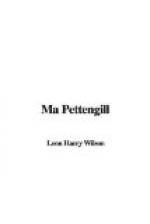“Then it’s one jolt after another for her till the last ten feet of the last reel, when everything comes right somewhere on a ranch out in the great clean West where husband or son has got to be a man again by mingling with the honest-hearted drunken cowboys in their barroom frolics, or where daughter has won back her womanhood and made a name for herself by dancing the Nature dance in the Red Eye Saloon for rough but tender-hearted miners that shower their gold on her when stewed. Only, in this glad time of the last ten feet she still has to cry a-plenty because the clouds have passed and she’s Oh, so happy at last! Yes, sir; they get mother going and coming. And when she ain’t weeping she has to be scared or mad or something that keeps her face busy. Here—I got some programmes of new pieces Vida just sent me. You can see she’s a great actress; look at that one: ‘Why Did You Make My Mamma Cry?’ And these other two.”
I looked and believed. The dramas were variously and pithily described as The Picture with the Punch Powerful—The Smashing Five-Reel Masterpiece—A Play of Peculiar Problems and Tense Situations—Six Gripping Reels, 7,000 Feet and Every Foot a Punch! Vida Sommers, in the scenes reproduced from these plays, had indeed a busy face. In the picture captioned “Why Did You Make My Mamma Cry?” the tiny golden-haired girl is reproaching her father in evening dress. I read the opening lines of the synopsis: “A young business man, who has been made successful through his wife’s money, is led to neglect her through pressure of affairs, falls into the toils of a dancer in a public place and becomes a victim of her habit, that of drinking perfume in her tea—”
But I had not the heart to follow this tragedy. In another, “The Woman Pays—Powerful and Picturesque, a Virile Masterpiece of Red-Blooded Hearts,” Vida Sommers is powerfully hating her husband whom she has confronted in the den of a sneering and superbly gowned adventuress who declares that the husband must choose between them. Of course there can be no doubt about the husband’s choice. No sane movie actor would hesitate a second. The caption says of Vida Sommers: “Her Love Has Turned to Hate.” It may be good acting, but it would never get her chosen by the male of her species—the adventuress being what is known in some circles as a pippin.
I studied still another of these documents—“Hearts Asunder.” Vida Sommers has sent her beautiful daughter to the spring for a pail of water, though everyone in the audience must know that Gordon Balch, the detestable villain, is lurking outside for precisely this to occur. The synopsis beautiful says: “The mother now goes in search of her darling, only to find her struggling in the grasp of Gordon Balch, who is trying to force his attentions on her.” This is where Vida Sommers has to look frightened, though in a later picture one sees that her fright changed to “A Mother’s Honest Rage.” The result is that Gordon Balch gets his, and gets it good. The line under his last appearance is “The End of a Misspent Life.” Vida Sommers here registers pity. As Ma Pettengill had said, her face seemed never to have a moment’s rest.




